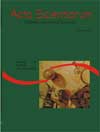<b>After the national curriculum paradigms: the fate of the Portuguese Language in secondary school</b> - DOI: 10.4025/actascihumansoc.v25i2.2176
Abstract
Portuguese Language teachers’ knowledge and application of the presuppositions in Secondary School National Curriculum Paradigms are provided. Research in nine state high schools in Maringá PR, Brazil forms the basis for our discussion on results dealing with the interface between pedagogical procedures employed by Portuguese Language teachers in high schools and the aims and suggestions given by SSNCP. Statements by teachers and survey of classroom procedures show that teachers try to discard traditional practices in reading, writing and linguistic analysis activities. However, they have difficulties in applying innovatory pedagogical procedures. Answers to the difficulties brought forth at the start of the research coupled to other observations on the problem are listed and discussed. Results have been positive since new possibilities in pedagogical practice were discussed. Moreover, the Language Department of State University of Maringá has been required to establish teacher-training courses involving new approaches on Portuguese Language teachingDownloads
Download data is not yet available.
Published
2008-04-15
How to Cite
Santos, M. do C. O. T. dos. (2008). <b>After the national curriculum paradigms: the fate of the Portuguese Language in secondary school</b> - DOI: 10.4025/actascihumansoc.v25i2.2176. Acta Scientiarum. Human and Social Sciences, 25(2), 241-249. https://doi.org/10.4025/actascihumansoc.v25i2.2176
Issue
Section
Literature and Linguistics
DECLARATION OF ORIGINALITY AND COPYRIGHTS
I Declare that current article is original and has not been submitted for publication, in part or in whole, to any other national or international journal.
The copyrights belong exclusively to the authors. Published content is licensed under Creative Commons Attribution 4.0 (CC BY 4.0) guidelines, which allows sharing (copy and distribution of the material in any medium or format) and adaptation (remix, transform, and build upon the material) for any purpose, even commercially, under the terms of attribution.
Read this link for further information on how to use CC BY 4.0 properly.























